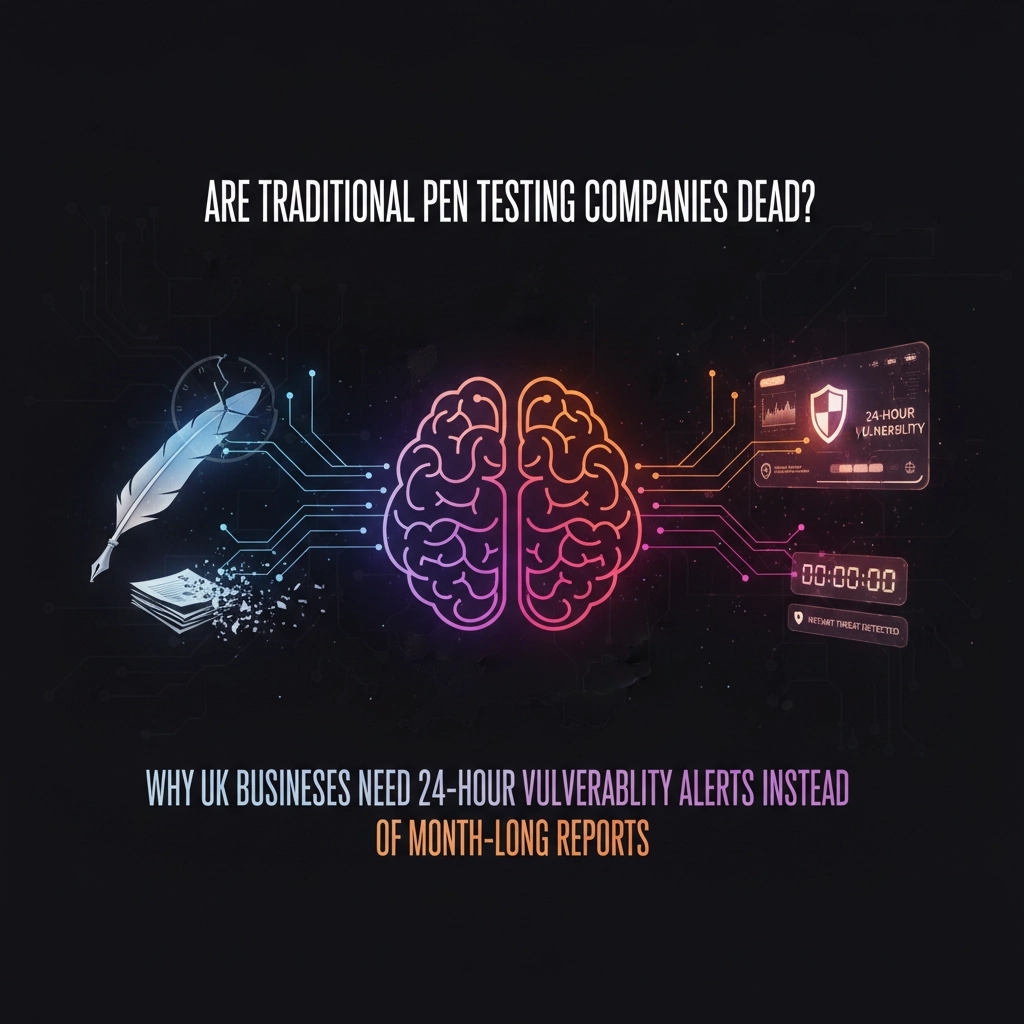The cybersecurity landscape has fundamentally shifted. While traditional penetration testing companies aren't completely extinct, they're rapidly becoming as relevant as a fax machine in a WhatsApp world. UK businesses are waking up to a harsh reality: waiting months for penetration testing reports whilst cyber threats evolve daily is no longer viable.
The numbers paint a stark picture. With 75% of UK enterprises experiencing breaches in the past 24 months, the traditional "test once, report later" approach is failing businesses when they need protection most. Modern threats don't wait for your annual pen test schedule, and neither should your security strategy.
The Death Knell for Traditional Penetration Testing Services
Traditional pen testing companies uk are struggling with fundamental flaws that make them increasingly obsolete for modern businesses. The most glaring issue? Scheduling delays that span weeks or months. When a business needs immediate security validation for a product launch or compliance deadline, waiting eight weeks for a penetration testing company uk to fit you into their calendar is simply unacceptable.

These delays aren't just inconvenient: they're dangerous. Cyber criminals don't schedule their attacks around your pen testing timeline. A vulnerability discovered today could be exploited tomorrow, but traditional penetration testing services uk often deliver findings when it's too late to matter.
The inflexibility of legacy providers compounds these timing issues. Most traditional penetration testing companies offer rigid testing packages that don't adapt to your specific business needs. Your e-commerce platform might need continuous application penetration testing services, but you're stuck with quarterly network scans that miss the real threats.
Why UK Businesses Are Abandoning Traditional Models
The UK market has been particularly quick to recognise these limitations. Research shows that 61% of UK enterprises now utilise software-based pentesting solutions, with 40% of UK CISOs citing automated security testing services as critical to their strategy.
This shift isn't just about technology: it's about business survival. When traditional penetration testing london providers take months to deliver actionable insights, businesses lose competitive advantage. Modern companies need security validation that moves at the speed of business, not at the pace of bureaucratic consulting models.

The financial sector exemplifies this transformation. Banks and fintech companies require continuous PCI-DSS penetration testing and ISO 27001 penetration testing compliance. Traditional providers simply cannot deliver the frequency and responsiveness these regulations demand whilst maintaining cost-effectiveness.
The Rise of Real-Time Security Validation
Modern penetration testing services have evolved beyond periodic assessments to provide continuous security monitoring. AI-powered platforms now offer 24-hour vulnerability alerts, automated threat detection, and real-time risk assessment: capabilities that traditional pen testing companies uk cannot match.
These advanced platforms don't replace human expertise entirely. Instead, they augment skilled penetration testers uk with technology that can process threats at machine speed. The result? Security testing services that provide immediate value rather than historical reports about vulnerabilities that may already be patched.
The global penetration testing market, projected to reach $1.86 billion in 2025, increasingly favours these automated and service-based models. Cloud security testing has seen a 47% year-over-year increase, reflecting businesses' need for continuous monitoring of complex hybrid environments.
What Modern UK Businesses Actually Need
Today's successful companies require penetration testing cyber security solutions that integrate with their development lifecycle. When your team pushes code updates daily, you need security testing services that can keep pace. Traditional quarterly assessments become meaningless when your application changes fundamentally every month.

Immediate Threat Response: Modern businesses need cybersecurity penetration testing that provides alerts within hours, not months. When a critical vulnerability appears, you need actionable intelligence immediately: not a beautifully formatted report delivered after the threat landscape has evolved.
Scalable Testing Approaches: Growing businesses require penetration testing providers that can scale testing frequency and scope without exponential cost increases. Traditional models charge premium rates for additional testing, whilst modern platforms offer unlimited testing within subscription models.
Compliance Automation: UK businesses juggling multiple compliance requirements need cyber essentials plus pentesting that automatically validates regulatory requirements. Manual compliance checking through traditional providers creates administrative burden and increases non-compliance risk.
The Technology Advantage
Modern penetration test service providers leverage artificial intelligence and machine learning to identify vulnerabilities traditional methods miss. These platforms can simultaneously test thousands of potential attack vectors whilst human testers focus on complex business logic flaws that require creative thinking.
Red team penetration testing has evolved beyond traditional methodologies to incorporate continuous adversarial simulation. Rather than scheduled "red team exercises," modern platforms provide ongoing attack simulation that tests your defences against evolving threat tactics.

Network penetration testing services now operate continuously, monitoring for new vulnerabilities as your infrastructure changes. Traditional providers might miss critical windows when new services are deployed or configurations change between testing cycles.
The Cost Reality Check
When examining penetration testing cost uk considerations, traditional models often appear cheaper initially but prove expensive when you factor in delayed findings, limited testing frequency, and missed threats. Modern platforms might cost more monthly but provide significantly better value through continuous coverage and immediate alerting.
Top pen testing companies uk are recognising this shift and adapting their models accordingly. Those that haven't evolved risk becoming irrelevant as businesses prioritise responsive, technology-driven security validation over traditional consulting approaches.
Making the Transition
Businesses transitioning from traditional penetration testing london providers should evaluate modern alternatives based on response time, testing frequency, and integration capabilities. The best computer security service providers now offer hybrid models combining automated continuous monitoring with expert-led testing for complex scenarios.

Small to medium businesses particularly benefit from this evolution. Only 32% of companies with fewer than 1,000 employees currently engage in regular penetration testing, largely due to cost and complexity barriers that traditional providers create. Modern platforms make comprehensive security testing accessible to businesses that previously couldn't afford traditional pentest service offerings.
The Verdict
Traditional penetration testing companies aren't dead, but they're becoming increasingly irrelevant for businesses that need responsive, continuous security validation. UK businesses facing high breach rates, strict regulatory requirements, and rapidly evolving threat landscapes cannot afford to rely on testing models designed for a slower, simpler cybersecurity era.
The future belongs to security testing services that provide immediate value, continuous monitoring, and real-time threat intelligence. Whilst traditional check penetration testing approaches may suit some specific use cases, the majority of UK businesses will find better protection, better value, and better business alignment with modern alternatives that prioritise speed, automation, and continuous security validation over lengthy reports that arrive too late to matter.
The question isn't whether traditional penetration testing companies will survive: it's whether your business can afford to wait for them to catch up with modern security realities.












Leave a Reply